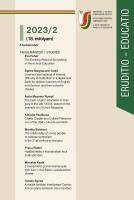Halálbüntetés a középkorban és a korai újkorban
Capital punishment in the Medieval times and in the Early Modern period
Author(s): Eszter PracuSubject(s): History, Comparative history
Published by: Pedagogická fakulta Univerzity J. Selyeho
Keywords: capital punishment; crime; early modern period; judicial practice; medieval period
Summary/Abstract: The study focuses on the development of capital punishment with an emphasis on the changes in understanding of the main concepts associated with it. The aim of the work is to provide a compact overview of the development of capital punishment from late antiquity to the 18th century, with regard to the key concepts of the topic, such as crime and punishment. Focusing particularly on the medieval and early modern periods, the text also highlights the purposes and motivations of the criminal justice system, seeking answers to questions such as: What did a given society consider just? What was the symbolic significance of the form in which particular punishments were carried out? What factors influenced judicial practice and punishments? The text also discusses the question of the transformation of society and the very notion of capital punishment, which will give us an insight into the mentality of the people of the time. We learn what role was attributed to death penalties and why medieval people found the executions so attractive that they became spectacles of horror. These ideas attempt to grasp the issue of the functioning of medieval and early modern criminal justice, a topic that is difficult to grasp from the perspective of modern man due to modern understanding of law and justice. The functioning of criminal justice today is in many ways diametrically opposed to the practices of the past, and it is therefore necessary to delineate the differences and attempt to explain the process of transformation that has taken place.
Journal: Eruditio - Educatio
- Issue Year: 18/2023
- Issue No: 2.
- Page Range: 081-091
- Page Count: 11
- Language: English

